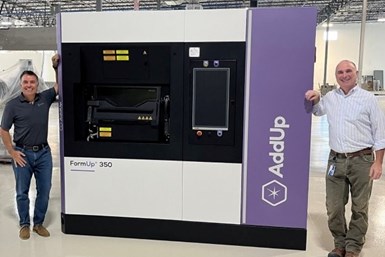Zeda Collaborates With AddUp for Aerospace, Medical Additive Manufacturing
The first of eight AddUp FormUp 350 powder bed fusion machines deployed has been installed at Zeda to support its growth in the aerospace and medical sectors.

AddUp CEO Rush LaSelle and Zeda CTO Greg Morris welcome the placement of the first FormUp350 system at Zeda’s new 75,000-square-foot facility in Cincinnati, Ohio. Photo Credit: AddUp
Zeda Inc. (previously PrinterPrezz/Vertex Manufacturing) — a provider of additive manufacturing (AM) and nanotech solutions for the medical, space, aerospace and defense industries — is partnering with AddUp to support its growth in the aerospace and medical sectors.
The company recently installed its first AddUp FormUp 350 Powder Bed Fusion (PBF) machine. This machine is the first placement of eight FormUp 350 systems to support the growth of Zeda’s newly expanded manufacturing facility in Cincinnati, Ohio.
The first FormUp 350 was deployed in March 2023 to print metal parts using Inconel 718 and will be qualified to support critical aerospace and defense part manufacturing. With fully certified ISO AS9100 facilities, Zeda says it is providing new levels of insight, understanding and application of 3D printing technologies. The company has identified unique capabilities made possible with AddUp’s FormUp 350 which aid in broadening the application of 3D printing technology and how it can be utilized across multiple industries, including those in regulated spaces such as aerospace and defense industries.
“We are pleased to be adding AddUp’s tools to our portfolio of advanced manufacturing technologies,” says Zeda CTO Greg Morris. “AddUp has demonstrated a set of capabilities that enable us to address unique design and application challenges faced by our growing base of aerospace, space and defense customers.”
Zeda aims to leverage unique process knowledge from the semiconductor industry and pioneering experience in producing 3D printed parts for aerospace, all to deliver cost-effective and high-quality AM for critical applications across numerous industries.
“The success that Greg Morris achieved in pioneering the use of additive manufacturing in regulated industries combined with the novel approaches being introduced by the extended Zeda team represent a critical service for our customers,” says AddUp CEO Rush LaSelle. “We couldn’t be more excited about the opportunity to collaborate with such a veteran team in delivering high-value metal components to industry using our factory proven solutions.”
Zeda is expanding to build out 75,000 square feet of advanced manufacturing space in Cincinnati, Ohio, to answer the growth in demand for metal 3D printing in the medical, aerospace, defense, space and energy sectors. Ohio is said to represent a high-growth manufacturing environment for AM with the Biden Administration announcing the AM Forward program in Cincinnati in 2022. The advanced manufacturing facility enables the expansion of production capacity with 30 additional printers in the near-term and factory space to implement over 100 tools as the business grows in the mid-term.
- In this video, Greg Morris, CTO of Zeda (formerly PrinterPrezz/Vertex Manufacturing), talks about machining, inspection and other operations that complete AM.
- Here is another video featuring Zeda CTO Greg Morris. This time he discusses changes in the understanding of AM over time.
- Learn more about AddUp’s new North American headquarters where it showcases its laser powder bed fusion and directed energy deposition technologies.
Related Content
-
ActivArmor Casts and Splints Are Shifting to Point-of-Care 3D Printing
ActivArmor offers individualized, 3D printed casts and splints for various diagnoses. The company is in the process of shifting to point-of-care printing and aims to promote positive healing outcomes and improved hygienics with customized support devices.
-
Cranial Implant 3D Printed From Hydroxyapatite Ceramic: The Cool Parts Show #76
Cranial implants are typically made from titanium or PEEK; in this episode of The Cool Parts Show, we look at how implants made from a bioceramic can improve osseointegration and healing.
-
3D Printed PEEK Spine Implants in Production: The Cool Parts Show Bonus
Curiteva is using Fused Strand Deposition to produce two different lines of FDA-cleared spine implants. We visited the company’s Huntsville, Alabama, facility to learn more.















